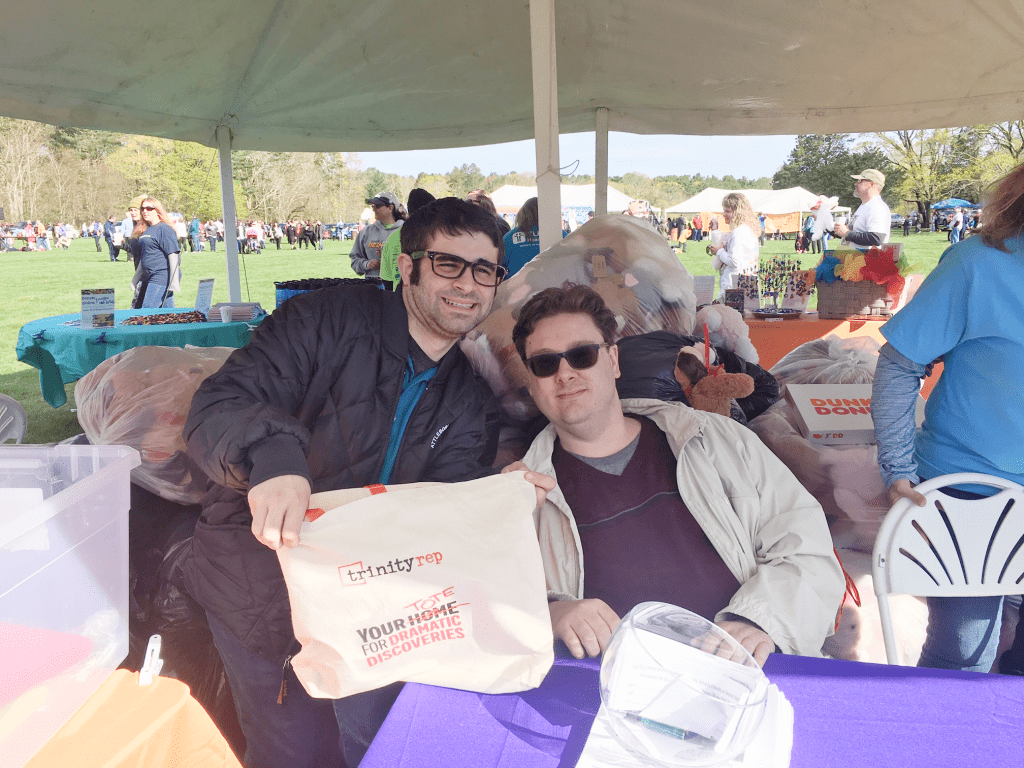4/25/19
Digital Marketing Coordinator Caitlin Howle and Marketing Intern Maxwell Snyder sat down with Dan Boyle and Daniel Perkins, our two Sensory Friendly Coordinators, who help coordinate the Sensory Friendly and Sensory Friendly Plus! Performances at Trinity Rep.

Caitlin Howle: Let’s talk about you guys! How did you come to Trinity Rep?
Dan Boyle: I’ve been working with Trinity Rep for a little over a year now. I was helping out with Sensory Friendly before then but came in as a Sensory Friendly Coordinator in January.
Daniel Perkins: I started out as a Project Discovery student coming to see Shakespeare plays. I started assisting Jordan Butterfield with TRAIN, which is a program designed for kids who are on the autism spectrum. Two years ago, I applied to be a house assistant and I’ve been one of the faces here ever since, working a lot with Sensory Friendly in that time.
Maxwell Snyder: Coming into the theater having been diagnosed on the autism spectrum, how do you feel about making theater accessible?
DP: It’s definitely necessary. And I feel like there is a lot going on with autism awareness right now, and many other sensory processing disorders. We still have a long way to go, but I feel like we’re doing more than we could ever imagine, especially now that we have a Sensory Friendly performance for every show. Shameless plug – you can subscribe to the full Sensory Friendly season!
CH: How do you guys prepare audiences for these shows? What is your process?
DB: Basically, we see the final dress rehearsal of the show and we take a list of everything that we see that we think might trigger something – a sensory response, PTSD response, or anything like that and we write it down. We come up with a list of all these potential triggers and insert the lists into the programs for the Sensory Friendly performances as well as put them online.
DP: Certain plays have intense moments, like the man-eating plant in Little Shop of Horrors. I know it’s a puppet but it’s still supposed to eat people and I want to make sure people are prepared for that. So during these intense moments, there’s a red light on either side of the stage to let people know there is a potentially triggering moment coming up. We bold the lines leading up to each moment on the trigger list so people know when to cover their ears, their eyes, or leave the room should they feel uncomfortable.
CH: If you feel scared or nervous during a performance, it’s okay to leave?
DP: Definitely! You shouldn’t be embarrassed to leave. If you’re not comfortable, that’s totally fine. We have a system for that and staff in the lobby waiting to be of assistance.
DB: Even if you’re simply having a moment of sensory overload, that’s okay! We have someone inside the theater to keep an eye on the crowd to see if anyone is having any difficulties. If they notice you’re having trouble, they may discretely ask if you want to step out. Once you step out, there’s someone in the lobby for you to talk to if you want or if you don’t want to talk, that’s okay too. Then if you’re ready to go back in, we can help you right back to your seat.
MS: There are a lot of resources during the show. Do you have any tools patrons can use to prepare themselves for the performance?
DP: We create a social story, which is a step-by-step process on the page with pictures of our team, including myself, as well as details about the show. The main thing we focus on is the language – we want to be able to be as inclusive and accessible as possible. It’s a tool that our audience members can use to be a little more prepared when they come to the theater.
CH: What do you want people to take away from Sensory Friendly performances?
DP: That it’s just like every other show, it just has a few accommodations for people who might not feel comfortable going to the theater otherwise. It’s not to single anybody out at all. We just want people to come in, feel comfortable, and enjoy the theater experience without having to feel like “I’m a different person in a different environment.” We want them to feel as welcome as possible.
DB: I think it’s important for people to know that this makes theater accessible to everybody. Neurotypicals can come in and be fine in a Sensory Friendly performance, but it’s made specifically to help people with sensory processing disorders.